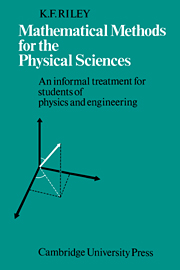 Mathematical Methods for the Physical Sciences
Mathematical Methods for the Physical Sciences Book contents
- Frontmatter
- Contents
- Preface
- Mathematical symbols
- 1 PRELIMINARY CALCULUS
- 2 VECTOR ALGEBRA
- 3 CALCULUS OF VECTORS
- 4 VECTOR OPERATORS
- 5 ORDINARY DIFFERENTIAL EQUATIONS
- 6 SERIES SOLUTIONS OF DIFFERENTIAL EQUATIONS
- 7 SUPERPOSITION METHODS
- 8 FOURIER METHODS
- 9 PARTIAL DIFFERENTIAL EQUATIONS
- 10 SEPARATION OF VARIABLES
- 11 NUMERICAL METHODS
- 12 CALCULUS OF VARIATIONS
- 13 GENERAL EIGENVALUE PROBLEM
- 14 MATRICES
- 15 CARTESIAN TENSORS
- 16 COMPLEX VARIABLES
- SOLUTIONS AND HINTS FOR EXERCISES AND EXAMPLES
- INDEX
12 - CALCULUS OF VARIATIONS
Published online by Cambridge University Press: 05 February 2012
- Frontmatter
- Contents
- Preface
- Mathematical symbols
- 1 PRELIMINARY CALCULUS
- 2 VECTOR ALGEBRA
- 3 CALCULUS OF VECTORS
- 4 VECTOR OPERATORS
- 5 ORDINARY DIFFERENTIAL EQUATIONS
- 6 SERIES SOLUTIONS OF DIFFERENTIAL EQUATIONS
- 7 SUPERPOSITION METHODS
- 8 FOURIER METHODS
- 9 PARTIAL DIFFERENTIAL EQUATIONS
- 10 SEPARATION OF VARIABLES
- 11 NUMERICAL METHODS
- 12 CALCULUS OF VARIATIONS
- 13 GENERAL EIGENVALUE PROBLEM
- 14 MATRICES
- 15 CARTESIAN TENSORS
- 16 COMPLEX VARIABLES
- SOLUTIONS AND HINTS FOR EXERCISES AND EXAMPLES
- INDEX
Summary
In a previous chapter it was shown how to find stationary values of functions of a single variable f(x), of several variables f(x, y,…) and of constrained variables f(x, y,…) subject to gi(x, y,…) = 0, (i = 1, 2, …, m). In all these cases the forms of the functions f and gi were known and the problem was one of finding suitable values of the variables x, y,…
We now turn to a different kind of problem, one in which there are not free variables which must be chosen in order to bring about a particular condition for a given function, but in which the functions are free and must be chosen to bring about a particular condition for a given expression which depends upon these functions.
To give a more concrete example of the type of question to be answered, we may ask the following. ‘Why does a uniform rope suspended between two points take up the shape it does? Why doesn't it hang in an arc of a circle or in the form of three sides of a rectangle? Is it possible to predict the shape in which it will hang, that is to find a function, y = y(x), that gives the vertical height of the rope as a function of horizontal position?’
Information
- Type
- Chapter
- Information
- Mathematical Methods for the Physical SciencesAn Informal Treatment for Students of Physics and Engineering, pp. 332 - 348Publisher: Cambridge University PressPrint publication year: 1974